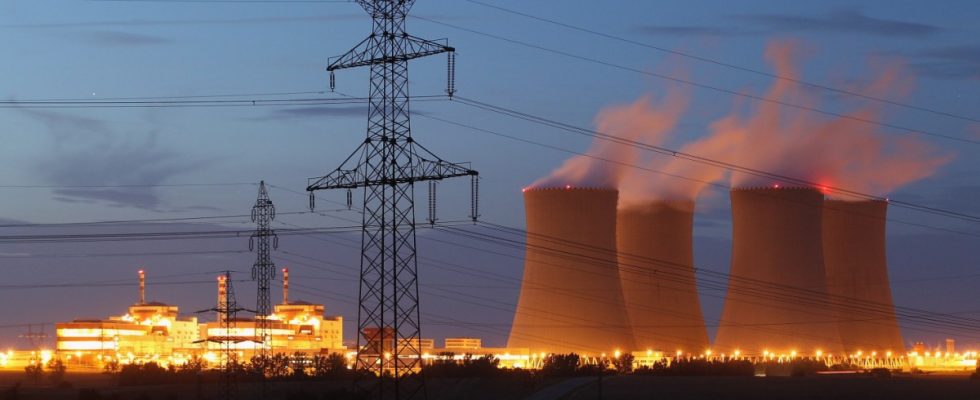Petr Fiala wants independence in energy supply. The Czech Republic should be able to produce enough electricity for the population and industry. Without any rogue states interfering. According to its prime minister, the Czech Republic can only achieve independence and meet its climate goals with nuclear energy.
“The Czech Republic has always relied on nuclear energy,” said the conservative politician at a summit on nuclear energy in Brussels at the end of March. Fiala is proud that the Czech Republic was involved in promoting nuclear power as, as he says, a “clean energy source worth supporting” in Brussels. “We are convinced that nuclear power is one of the options for meeting climate goals.”
Four reactors for the price of three?
In January, Fiala announced that instead of a long-planned new reactor at the Dukovany nuclear power plant in Moravia, four new units could be built – two in Dukovany and two in Temelín in southern Bohemia. Then there would be a discount, Fiala explained at the time, and ultimately the country would get four reactors for the price of three. Whether this will actually happen remains to be seen as the tender progresses. The French company EDF and the South Korean KHNP are expected to submit more detailed offers by mid-April.
With four new reactors, the share of nuclear energy in the Czech electricity mix would increase significantly. It is currently up to 40 percent. Fiala’s government in Prague envisions it to be at least 50 percent by 2050.
The country is also investing in research into so-called modular reactors. The first one could also be built in Temelín. The location is still on the short list, as the semi-state energy company ČEZ announced in March. Other possible locations are Tušimice near the Saxon border and Dětmarovice near the Polish border. The geological conditions here are favorable.
The captain of the South Bohemia district, Martin Kuba, is pleased about this; He signed a memorandum on close cooperation with the ČEZ a long time ago, reports Czech Radio. The mayor of the town of Temelín, Josef Váca, said his only concern was that there would then be even more overhead power lines. “We already have enough of that.” “We would be happy if the cables could be laid underground.”
Almost half of the electricity comes from coal-fired power plants
Prime Minister Fiala and the two local politicians are not alone in their enthusiasm for nuclear power. In surveys conducted by the opinion research institute IBRS, around 70 percent of respondents support the use of nuclear energy. Also because, like their prime minister, they see it as a reliable source of energy in uncertain times.
The respected nuclear energy research center ÚJV in Řež near Prague or institutes of the Academy of Sciences do the rest for this kind of enthusiasm for technology. A physicist from the academy told Czech radio in February that 50 percent nuclear energy was not bad, but two thirds would be much better for a stable energy supply. Renewable sources are far too unreliable.
In North Bohemia, however, ČEZ wants to start building two photovoltaic power plants in 2025. Each will have an output of 100 megawatts – a tenth of what a nuclear power reactor in Temelín generates. So far, renewable energy sources have played little role in the Czech electricity market: in 2022, sun, wind and biomass generated just 5.4 percent of Czech electricity. This is according to statistics from the energy marketing company OTE.
Brown coal is still the country’s main source of energy; almost half of the electricity comes from coal-fired power plants – a truly domestic source after all. Until the Russian attack on Ukraine, the fuel rods for the Czech nuclear power plants still came from Russia. The supply is now said to have been used up, the US company Westinghouse is filling the gap. As a result, the Americans dropped out of the race to build new nuclear reactors.
Opponents warn of national debt and a lack of final storage facilities
Some people in the Czech Republic would also be relieved if the four blocks were not created. The opponents’ main argument is the price. The ČEZ itself points out that the costs can only be met with generous help from the state. The Czech Ministry of Finance expects a price of 1.75 trillion Czech crowns for four reactors – the equivalent of around 70 billion euros.
The state would have to go into considerable debt, but nuclear energy would also end up costing consumers dearly, say critics such as Edvard Sequens from the environmental movement Calla. Last but not least, Sequens writes in one of his posts calla.czmore nuclear power plants would ultimately only require deeper and deeper repositories – and the locations for them have not even been found yet.
Also the business newspaper Hospodářské Noviny points out that the stubborn adherence to nuclear energy suppresses discussion about other sources. In addition, the state has been assuming that energy requirements are far too high for years. The Czech Republic is already the fourth largest exporter of electricity in Europe.

